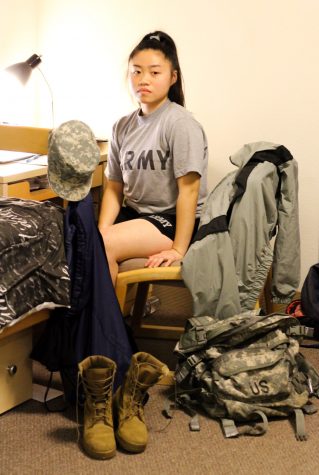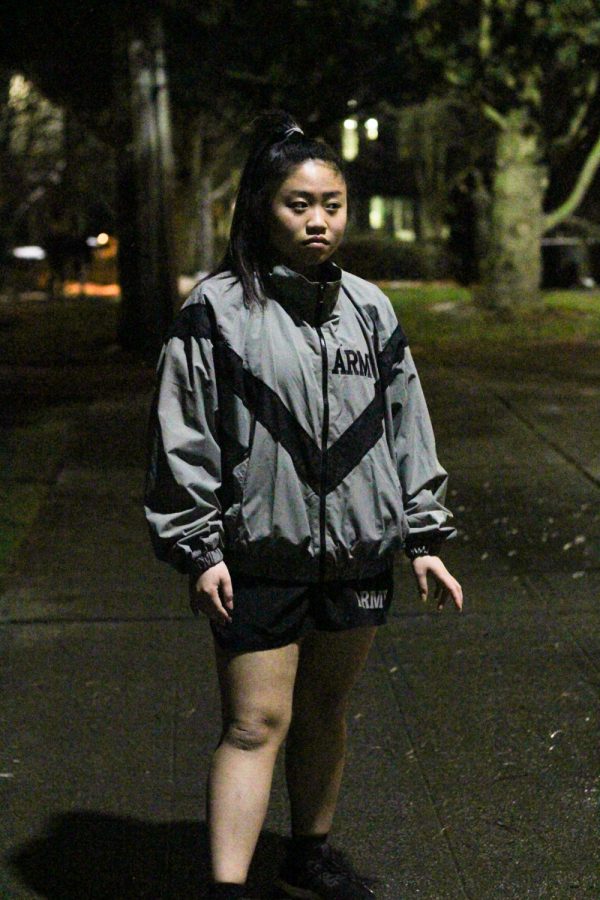Serving country, gaining education
January 15, 2020

Sophomore Nikki Au prepares her ACU uniform for an ROTC leadership lab at University of Washington. (Tuesday January 14th, 2020)
For the average college student, it may seem unimaginable to add something as time intensive and personally challenging as military service to their already packed schedules. Yet, for Nikki Au and Mariah Kelly it’s a challenge and a sacrifice they happily accept. Nikki Au is a member of the Army ROTC at UW, while Mariah Kelley is a member of an army unit that reports out of Spokane, Washington.
Both joined the military in part because of the financial benefits received for being enlisted. Both receive payment in the form of scholarships and possible paychecks. While this an obvious perk, both Kelley and Au have much more meaningful reasons for choosing a military life.
“I wanted to join the military because it would mold me into an overall better person mentally and physically,” Au said.
“It allows you to gain leadership experience unlike any other program,” said Kelly
While both believe they are gaining a lot from their military choices, there are obvious sacrifices which other college students do not have to worry about.
“I have different commitments and obligations I have to adhere to that no one else does,” Kelley said. “Being in the reserves, I leave once a month to go to Spokane for my unit, and juggling classes as well as paperwork and duty is difficult at times.”
Both Kelley and Au also have packed schedules, “Monday, Wednesday and Friday we have Physical training at the University of Washington,” Kelley said. “We leave SPU at 5:20 a.m. and get back to SPU at 8:00 a.m., sometimes barely in time for classes.”
Both students also have mandatory leadership classes on Thursday, with field exercises on the weekends.
In the presently polarized political climate of the United States, both Au and Kelley are forced to consider their roles in the military before openly expressing their opinions on the country’s leadership.
“As a member of the armed forces you’re not allowed to disparage your superiors,” Au said. “So I wouldn’t be able to get on social media and say ‘This president sucks!’ or ‘This secretary definitely sucks.’ But just like a regular citizen I can discuss politics and my opinions on such things, but there is always an appropriate time and place and a need to be professional.”
Both Kelley and Au are forced to be level-headed and to think hard before speaking on politics and other issues. This professionalism can make them an asset in class discussions.
“People look at me for a different perspective, but in order to be respectful I have kept quiet on my own things,” Kelly said.
“The tensions in Iran affect ROTC by causing cadets to be more aware of their surroundings and having better situational awareness with the general public when it comes to showing affiliation in the US military,” Au said when asked about the current conflict with Iran
Despite their packed schedules and the many other sacrifices the active military life imposes, both Kelly and Au are appreciative of the opportunity afforded to them. Both encourage other students to join an ROTC or active military branch.
“If I were recruiting someone into ROTC, I would inform them of all the financial and educational opportunities that are offered for cadets.” Au said. “This goes for schooling as well as the overall experiences and free career training that the military can give you.”
Correction: Jan. 15, 2020. A previous version of this story stated that Nikki Au is in the Air Force ROTC. Nikki Au is in the Army ROTC.




























































































